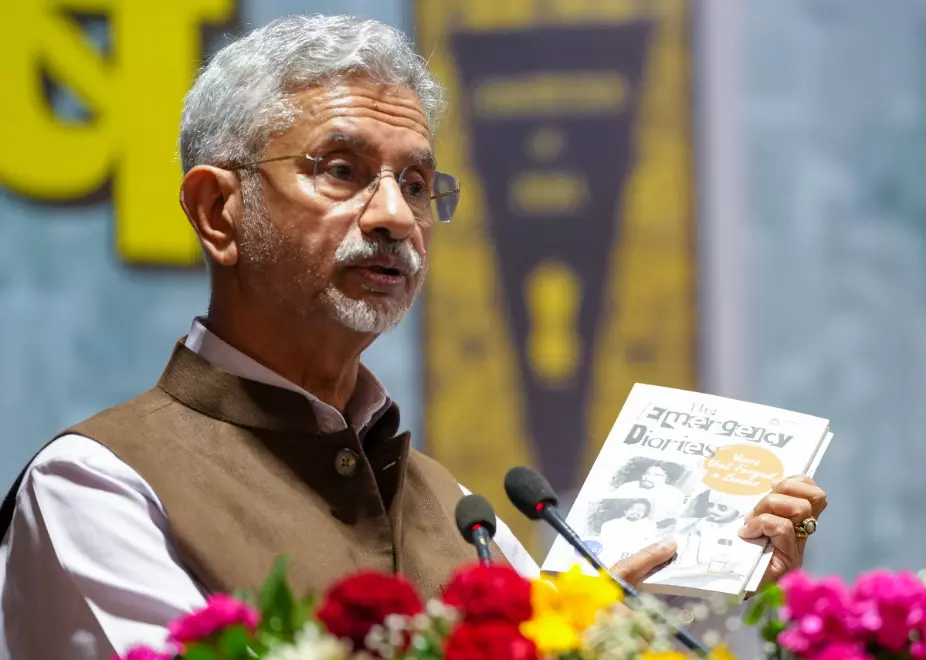Indian fishermen nabbed by Sri Lanka because their rights given up during Emergency: Jaishankar

New Delhi: The issue of Sri Lanka arresting Indian fishermen stems from an agreement during the Emergency under which their rights for fishing in some specific areas were given up, External Affairs Minister S Jaishankar said on Friday.
The agreement with Sri Lanka would not have been possible if a genuine Parliament functioned at that time, Jaishankar said at an event organised by the BJP Yuva Morcha to mark the 50th anniversary of the Emergency.
Katchatheevu, an uninhabited island was ceded to Sri Lanka by then Indira Gandhi regime in the country under a maritime agreement in 1974. Further, another agreement signed in 1976 restricted the fishermen of both countries from fishing in the other's exclusive economic zones.
Jaishankar said big decisions were sometimes taken without any parliamentary debate during the Emergency period.
"We hear about our fishermen arrested by Sri Lanka. The reason is that an agreement was entered into during Emergency under which the rights of the fishermen for fishing in some sea waters of Sri Lanka was abandoned," Jaishankar said.
Had a genuine Parliament functioned at the time, there would have been a debate and this decision would not be accepted, the minister said.
The consequences of this decision are still visible in Tamil Nadu, he added.
Jaishankar said the image of India as the oldest and largest democracy in the world took a beating when the Emergency was imposed on June 25, 1975. He also recalled his own experiences of police raids at hostels of the Jawaharlal Nehru University and his family's links with leaders like George Fernandes.
"I heard from my seniors in the foreign service how difficult it was to defend India after the murder of the Constitution and democracy by the imposition of Emergency," he said.
In a broadside against the Gandhis, Jaishankar said an Emergency situation arises when the "family" is kept ahead of the country. "Some people keep the copy of Constitution in their pockets but have other intentions in their hearts," he said in a dig at Congress leader Rahul Gandhi.
He questioned the Congress over never apologising for imposing Emergency in the country and said it was not just a political issue but an attack on the way of life of the people and caused solely due to one family.
He said people should be empowered to avoid any situation in the future because an empowered public would never let it happen.
Referring to the 'mock parliament' hosted by the Bhartiya Janta Yuva Morcha (BJYM), Jaishnakar said the younger generation must learn how the Congress "strangled" the Constitution out of "greed for power".
The external affairs minister also visited an exhibition over 50 years of Emergency along with Delhi BJP president Virendra Sachdeva.
He said the opposition repeatedly claims there is an "undeclared" Emergency, and added, "I want to clarify that this is not the time of an Emergency nor will there be one in the future. That is why we are all present here at this mock parliament today."
Freedom should never be taken lightly, he said.
"Some people are in the opposition now — I want to ask them, what was their stance during the Emergency? I clearly remember that some of the people who are now aligned with the opposition were against the Emergency in 1975. But today, they stand with those who imposed it," he stated.
During the Emergency, five Constitutional amendments and 48 Ordinances were brought out one of which stipulated that the Emergency provisions can not be challenged in any court, he said.
The democratic manner in which people protested during the Emergency and paved way for fresh elections shows that democracy is in our DNA, Jaishankar asserted. The elections happened because the people of India rejected the Emergency.
He also said a deep national pride reflected after Operation Sindoor, when senior opposition leaders joined delegations to different countries to put forth India's stand. It was also an antidote to situations like Emergency, he said.
"The events of 50 years ago should not just be viewed as history — they still live on in the minds of many. Therefore, we must remain cautious of those who still have no regret about the Emergency," he added.



